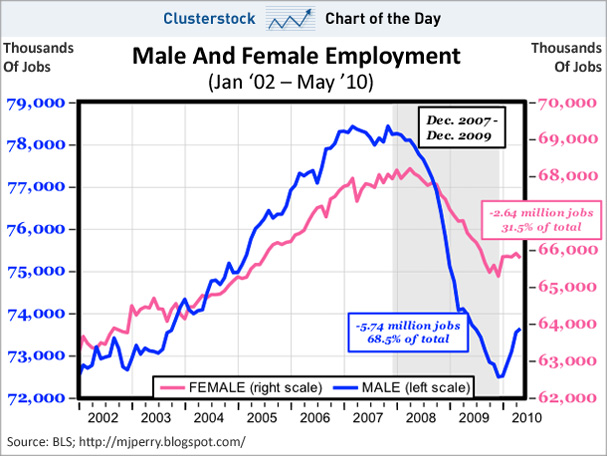Sunday, October 31, 2010
Deepwater oil: Brazil hits a big one
Unless, of course, you are worried about the impact of the oil economy on the climate, this is some very nice news:
Together with Tupi, a nearby field also in Brazil’s offshore that contains five billion to eight billion barrels, Libra “represents far and away the biggest source of new oil we’ve found in several decades. And there appears to be plenty of promise that they will find more,” said Julius Walker, senior oil analyst with the International Energy Agency.
“Which makes it a very big deal. We’re talking about the single biggest source of new non-OPEC crude oil.”
Unless, of course, Brazil joins OPEC.
(8) Comments
The all-important candy hierarchy
Via boingboing, the "candy hierarchy." Brief commentary follows.
Personally, I'd kick Junior Mints in the top tier -- they are the TigerHawk mainstream candy of choice, particular at movies -- but otherwise I think this nailed it. Of course, if we are going to move in to more obscure sub-brands, I would put Sour Skittles, for which I have a newly-discovered taste, in to one of the upper-tiers. But they are hard to find and are clearly a subtle articulation of the wider Skittles brand, which I can generally do without.
(17) Comments
Your media in action
The CBS news affiliate in Alaska lets its mask slip:
One lesson sure to be learned from this year’s midterms is that it’s important to make sure you have properly hung up your phone. Yesterday members of a CBS affiliate crew in Alaska were accidentally caught on a answering machine discussing finding negative stories about Joe Miller to cover in the final days of his campaign.
Apparently it was newsworthy to search gleefully for and publicize "registered sex offenders" among the volunteers on Joe Wilson's campaign. Y'ask me, that is unprincipled and anti-social badness at more than level. It would be bad enough coming from the enemy camp, but from CBS? Oh, wait.
(6) Comments
Saturday, October 30, 2010
Trick-or-treat!
A special Saturday evening trick-or-treat exploitation link. Fun for everybody except, of course, those crazy people who hate NSFW painted on costume pics.
(5) Comments
Friday, October 29, 2010
The explosive packages
The major story of the day has of course been the discovery of explosive packages bound for the U.S.
President Barack Obama declared Friday that authorities had uncovered a "credible terrorist threat" against the United States following the overseas discovery of U.S.-bound packages containing explosives aboard cargo jets. Obama said both had been addressed to Jewish organizations in the Chicago area.While this story is still developing, and it isn't yet clear whether this was a probe and dry run, or an actual attempted attack, it is notable that other AQ attacks have occurred just prior to elections in Western countries. That is one reason to dismiss the notion that I have seen percolating around the comments section of the righty blogosphere -- that the Obama administration is talking up what is otherwise a low level threat to generate a rally 'round the flag effect in the run up to Tuesday's elections, in hopes that such an effect would help the incumbent party. It isn't clear to me that highlighting a major threat this weekend would help Democrats on Tuesday, since national security isn't something most candidates in that party have stressed in their campaigns. It might remind voters that under the Bush administration, there were no successful large-scale terrorist attacks on U.S. soil after 9/11, and that might somehow help Republican candidates. If there is a political benefit either way from this story, I think it is small, and is unlikely to alter any one race, nor have any impact on the aggregate result. Moreover, I would expect conservatives and centrists to rise above the claims made by the left during the Bush years that the Bush administration would routinely tweak the threat levels for political reasons.
The disclosures triggered a worldwide alert amid fears that al-Qaida was attempting to carry out fresh terror attacks.
It is entirely possible that AQAP is trying to influence the election somehow, though I can only speculate to attempt to understand their analytical thinking. It is curious that Jewish organizations in Chicago were targeted, since many of the people in such organizations represent a significant part of President Obama's base, dating back to a point early in his political career. Perhaps AQAP could be trying to send a message to the president -- "you have increased attacks against our brothers fighting in Afghanistan, so we will attack your political supporters."
(4) Comments
Pumpkin pi
The picture of the day from my Facebook scroll:
Credit: Regular commenter "Bomber Girl."
(2) Comments
It's a Governor Awesome morning!
We just can't stop The Christie around here. Here's New Jersey's Governor Awesome mocking the New Jersey legislature for failing to reform the absurdly bloated and catastrophically underfunded public employees pension scheme. This style might not work in most states, but it works here.
The clown brigade in Trenton will do anything and everything to avoid taking anything away from the public employee unions.
(5) Comments
Thursday, October 28, 2010
Governor Christie recounts his first days
Via Ace, Chris Christie tells the story of his first day and first few weeks in office, and does not have many nice things to say about Jon Corzine, who evidently wired huge dollars out of the state treasury and into the hands of select cities in the last few hours of his administration.
Governor Christie is quite funny in the last section of the video, and his personality seems to play pretty well in the Midwest. It makes you wonder about a national office in his future. Could a trip to Iowa be on the schedule? Southern New Hampshire is a pretty easy trip from northern New Jersey.
I do wonder, however, whether someone will jump on Governor Christie's use of the term "limousine liberal" in connection with Jon Corzine -- not because it is an inaccurate characterization, but because Corzine nearly died in a limousine/SUV accident in April, 2007. I suppose that there is a metaphor somewhere in there, and I doubt that Governor Christie would care a great deal that he might come across as insensitive toward his predecessor.
CWCID: Ace
(7) Comments
Tonight, I hate AT&T and Apple Computer (UPDATED!)
Sad to say, my 3G iPad was stolen from my house while I was on my last business trip. The thief was apparently a big user of the 3G service, because I began getting emails from AT&T about how I was almost out of the available data in the current month's plan, and if I wanted to buy more I could do so through the "settings" on my iPad. Not wanting the thief to enjoy another month of 3G browsing at my expense, I called AT&T to shut off the service. Notwithstanding that they have been charging my credit card $14.95 per month and sending me emails, in over 30 minutes of futile struggle Ma Bell's crack customer service department could not find (and therefore terminate) my account by searching (i) my name, (ii) my credit card number, (iii) the code AT&T puts on my credit card statement to charge me, (iv) the email address that AT&T is using to bombard me with emails, or (v) the serial number from my iPad. Apple Computer was unavailable to help, according to AT&T, but they would try again tomorrow. While AT&T has promised to search their records further and call me if they find a lead, I am apparently in some data limbo and will be unwillingly financing the thief's internet fun for the foreseeable future.
It is astonishingly bad service from both companies and tonight, at least, I wish them only the very worst. Think twice before dealing with either of them.
UPDATE (the next day): Both fairness and genuine satisfaction require me to report AT&T has come through impressively. Several of our loyal readers work for AT&T, and one of them reached out to put in an internal "complaint" in the AT&T quality system. Within hours it had risen in the company, and about 4:30 EDT I received a call on my cell phone from the "office of the president of AT&T." A very helpful solver of problems was able to connect me with the info tech people in "iPad support" and terminate my 3G coverage, no problem. An excellent and impressive recovery from a rocky start that has gone a long way to revising my attitude about AT&T's customer service. Yes, it still needs for its databases to talk to each other -- during the day, another reader reported that just today he had cancelled his 3G service and subsequently received emails reminding him that his data allowance was running low -- but I was impressed with the ultimately effective response from the top.
(17) Comments
Merkel 1, Obama 0
Four months ago,"Merkel at odds with Obama on financial policy":
German Chancellor [and German Tea Party candidate - ed.] Angela Merkel on Saturday contradicted US President Barack Obama, saying that Europe will push for a swift exit from fiscal stimulus programs and focus instead on budget cuts at the G20 meeting.
This morning, "German Unemployment Dips to 18-year Low":
German unemployment fell slightly in October, dropping to its lowest level in 18 years as the impact of persistently strong growth in Europe's top economy continued to filter through to the jobs market.
They told me that if I voted for McCain our president would lecture foreign leaders about matters he knew nothing about, and they were right!
(2) Comments
Governor Awesome endorses my man Scott Sipprelle
It has been a long time since the endorsement of the governor of New Jersey meant something, but surely now it does. Chris Christie endorses Scott Sipprelle to represent New Jersey's 12th Congressional District in the United States Congress.
(2) Comments
"Dude"
Dana Milbank provides his post-game analysis of President Obama's appearance on Jon Stewart's The Daily Show.
The Daily Show host was giving Obama a tough time about hiring the conventional and Clintonian Larry Summers as his top economic advisor.President Obama smiled and didn't seem to mind the use of such a familiar term (it is in the third video segment at the Daily Show link above, at about 1:45), but it hard to imagine a previous president of either party sitting there and being called "dude." Maybe I am too old school, or just too old, but even though I disagree with many things the Obama administration has done and is doing (and we all express that here on the blog), I would hope that I would have enough respect for the office to refer to him, or any other sitting POTUS, as "Mr. President" in person. Is it me, or does it seem as though the office itself has become much less revered since the early 1990s? I just can't visualize President Reagan sitting next to a TV host and being called "dude." Maybe he would glare back, or maybe he would smile a bit and retort, "I do have a ranch in California, but it's not a dude ranch."
"In fairness," the president replied defensively, "Larry Summers did a heckuva job."
"You don't want to use that phrase, dude," Stewart recommended with a laugh.
Dude. The indignity of a comedy show host calling the commander in chief "dude" pretty well captured the moment for Obama. He was making this first-ever appearance by a president on the Daily Show as part of a long-shot effort to rekindle the spirit of '08. In the Daily Show, Obama had a friendly host and an even friendlier crowd.
But, as in his MTV appearance a couple of weeks ago, Obama didn't try to connect with his youthful audience. He was serious and defensive, pointing a finger at his host several times as he quarreled with the premise of a question.
Milbank's review fleshes out the dissatisfaction of the Democratic base, which seems to have more of a tendency to make the perfect -- from that perspective -- the enemy of the good, as compared to the Republican base. It is odd that an over-abundance of idealism and resulting disillusionment could be a contributing factor to the loss of the House for Democrats, but I think Jimmy Cliff puts it best.
(4) Comments
Wednesday, October 27, 2010
Scott Sipprelle invades the homeland
The New Jersey 12th Congressional district, which includes Princeton, has long been a Democratic stronghold. Our Congressman, Rush Holt, is a college town academic liberal ("My Congressman IS a rocket scientist") and voted with Nancy Pelosi in the current session more than 99% of the time. His challenger, Republican Scott Sipprelle, has pulled within the margin of error in recent polls, though, and therefore stands a real chance of putting Princeton and environs in the Republican column for the first time in ages. As importantly, Sipprelle is taking the fight deep in to the Democratic stronghold in Trenton:
South Ward residents who answered their doors Sunday afternoon were treated to a sight that has become a rarity in the city: a Republican candidate stumping for nationwide office.
Scott Sipprelle, the venture capitalist running to unseat Democratic Rep. Rush Holt in New Jersey’s 12th District race Nov. 2, came to Trenton to rally supporters, knock on doors, and generally make his presence known.
“I heard people say they’ve never seen a Republican campaigning on their street,” Sipprelle said.
Republicans this election season are reaching out more than ever before to Trenton residents, many of them minority voters who traditionally vote Democratic. It could make the difference for candidates such as Sipprelle, who is in a tight race with Holt, according to the polls.
Brush 'em back.
(7) Comments
Tuesday, October 26, 2010
How a statist thinks
Statists betray themselves. For example, your Vice President, Joe Biden:
“Every single great idea that has marked the 21st century, the 20th century and the 19th century has required government vision and government incentive,” he said.
Really? What constitutes a "great idea"? Unless Biden is proposing a tautology -- that only stuff that government "vision" inspires or government provides an "incentive" to do can be great -- then the very idea is ridiculous. How about the lightbulb? Thomas Edison might disagree. The telephone? Mr. Bell is rolling in his grave. The assembly line? Henry Ford had that better idea. The steam engine? The cotton gin? Antibiotics? The implantable cardiac defibrillator? Artificial joints? Organ transplantation? Most great ideas had nothing to do with government "vision" or subsidy, unless one's definition of "subsidy" is, say, the work of the Patent and Trademark Office.
It's a fair bet that even Christine O'Donnell never said anything quite so asinine, yet I have detected no widespread declaration by the media that Joe Biden is dumber than a box of rocks. Perhaps because that would not be news.
(23) Comments
News you can use: The "best small companies"
Forbes Magazine's annual list of America's "best small companies" is out. Did your company make the list?
(3) Comments
Monday, October 25, 2010
When off-shore drilling is illegal, only the East Timorese will drill offshore
Well, them and everybody else and their brothers.
EAST Timor is continuing to entertain plans to drill for oil in waters as deep as 1900m.
In one instance, it is using the contractor that was operating the Deepwater Horizon rig which exploded in the Gulf of Mexico in May.
Accompanying sharped-edged Facebook-friend commentary:
Guess what happens when a government implements inane, politically-based, moratoria and intentionally places roadblocks to offshore drilling. What happens is you kill American jobs, you reduce American energy independence, and from an environmental perspective, you send the rigs into the waters of countries that have no environmental capabilities whatsoever. D'oh.
"D'oh" in the sense of "duh," I'm sure.
(2) Comments
When the little interferences seem large
On Wednesday we are breaking ground on a rather significant renovation of my house here in Princeton which, in the end, will result in no additional square footage. Nevertheless, in order to get a permit from the borough I have to pay a $880 "construction fee" and a separate $171 "affordable housing fee." Affordable housing fee? Only a liberal could say that with a straight face. Here I am with my own little stimulus program, a construction project that will in the end cost significantly more than the average single family home in the United States and yet add nothing to the footprint of my house nor alter the appearance of its exterior, and the local government insists I pay it more than $1000 for the permission to hire many people to do this work on my own property. Not only does the "affordable housing fee" vex me as a matter of principle, but by making my house more expensive to renovate I will have less money to spend on stuff to go in it.
The government's little interferences are a lot more annoying when the really large ones have already sapped us of, well, our animal spirits. I respectfully submit that these little troubles on top of the big ones, in many different forms and shapes, fuel the new populist opposition to intrusive government with a conviction that no politician or pundit can supply on his or her own.
(16) Comments
Accountability watch
Regarding Nancy Pelosi, is there a wider gap between the promises and the performance in American politics today? Barack Obama, for example, has come much closer to doing what he has promised, at least if you were listening carefully during the 2008 campaign.
Reason enough to overturn the majority in the House.
(1) Comments
Elections and Turnout
I wonder if that doesn't explain at least some portion of the "enthusiasm gap."
I wonder...
(9) Comments
Sunday, October 24, 2010
The wages of Wikileaks: Understanding the Iraq war casualties
Glenn Reynolds notes that the early revelations from the "Wikileaks" exposure of classified Iraq war documents do not actually reflect well on the political left. In particular, the documents reveal that The Lancet's two infamous studies on casualties in Iraq, curiously released in October 2004 and October 2006, respectively, grossly overstated the death toll from that war. This should not surprise us, insofar as the second such study (which claimed 600,000 war-related deaths in Iraq through the summer of 2006, or almost six times the 109,000 deaths through 2009 revealed by Wikileaks) was funded and promoted by George Soros, a fact that was ignored in virtually all of the press coverage back when it mattered. Thus Wikileaks has torpedoed a "fact" to which the "reality-based community" ascribed totemic significance. Sadly, even now the respectable mainstream media neglects to make the point. Probably because George Soros was behind the original propaganda which the media dutifully transcribed. If that were widely understood it might not reflect well on the profession of journalism.
Now, you might say that whether there were 100,000 excess deaths in Iraq or 600,000, it hardly matters insofar as both numbers are huge. Well, maybe not.
And that’s leaving aside the argument about who actually killed the Iraqis, and whether more would have died under Saddam. Note also that this death toll is less than the number of people murdered in South Africa over the same period, and that even allowing for population differences, Iraq’s death toll is now lower.
The first really objective history of the Iraq war will have to wait until somebody who did not live through the propaganda around that war is old enough to write it. When that book is written, its main conclusion will turn on the path of Iraq and the greater Middle East in the years following the war, a story that has not yet unfolded. The discussion of the human costs of the war will be particularly interesting, however, because it will judge the competing claims of those who oppose the war -- that American and Coalition soldiers fought a dirty war that inflicted an unacceptably large number of civilian casualties -- and those who support it -- that civilian casualties were almost unbelievably low given the ferocity and duration of the counterinsurgency and in any case lower than the deaths attributable to Ba'athist rule over a similar number of years.
(34) Comments
Saturday, October 23, 2010
True colors
Just outside Princeton Stadium, about 3:15 this afternoon...
Just inside, a few minutes before...
(7) Comments
Friday, October 22, 2010
"Worked so hard"
Via Ace, a funny satirical video that is an anti-Barbara Boxer piece, ridiculing people who make a big deal of titles and credentials.
Call Me Senator from RightChange on Vimeo.
The interesting thing about all of the other characters in the video is that their status is generally earned by study and hard work, not bestowed temporarily by the voters for a fixed term. I'm guessing that we all know talented and accomplished people with impressive credentials, and that our favorites among them are the ones who want to be called "Bob" or "Alice."
(4) Comments
Tolerance is as tolerance does
Snarky it may be, but Michael Barone's observation about the relative intolerance of NPR listeners and Fox News viewers strikes me as spot on.
Reading between the lines of Juan’s statement and those of NPR officials, it’s apparent that NPR was moved to fire Juan because he irritates so many people in its audience. An interesting contrast: while many NPR listeners apparently could not stomach that Williams also appeared on Fox News. But it doesn’t seem that any perceptible number of Fox News viewers had any complaints that Williams also worked for NPR. The Fox audience seems to be more tolerant of diversity than the NPR audience.
The vitriol of the left toward Fox News is startling and, frankly, hard to square with intellectual honesty. Yes, we righties extract huge utiles from hammering on the New York Times and CBS News and such, but I have never heard of viewers demanding that Fox News fire putative conservatives because they also traffic in the liberal media. Bill O'Reilly would have been gone long ago if Fox News viewers were so closed minded.
CWCID: Glenn Reynolds.
(7) Comments
Stratfor on the death of Germany's Multikulti
Editor's note: Germany and the Failure of Multiculturalism is republished with permission of STRATFOR. There's a lot to reflect upon here, including the implicit point that many American liberals do not seem to understand the different objectives of multiculturalism here and in Europe. Oh, and consider commenting with reference to our own immigration policy, or lack thereof. Unleash the hounds.
By George Friedman
German Chancellor Angela Merkel declared at an Oct. 16 meeting of young members of her party, the Christian Democratic Union, that multiculturalism, or Multikulti, as the Germans put it, “has failed totally.” Horst Seehofer, minister-president of Bavaria and the chairman of a sister party to the Christian Democrats, said at the same meeting that the two parties were “committed to a dominant German culture and opposed to a multicultural one.” Merkel also said that the flood of immigrants is holding back the German economy, although Germany does need more highly trained specialists, as opposed to the laborers who have sought economic advantages in Germany.
The statements were striking in their bluntness and their willingness to speak of a dominant German culture, a concept that for obvious reasons Germans have been sensitive about asserting since World War II. The statement should be taken with utmost seriousness and considered for its social and geopolitical implications. It should also be considered in the broader context of Europe’s response to immigration, not to Germany’s response alone.
The Origins of the German Immigration Question
Let’s begin with the origins of the problem. Post-World War II Germany faced a severe labor shortage for two reasons: a labor pool depleted by the devastating war — and by Soviet prisoner-of-war camps — and the economic miracle that began on the back of revived industry in the 1950s. Initially, Germany was able to compensate by admitting ethnic Germans fleeing Central Europe and Communist East Germany. But the influx only helped assuage the population loss from World War II. Germany needed more labor to feed its burgeoning export-based industry, and in particular more unskilled laborers for manufacturing, construction and other industries.
To resolve the continuing labor shortage, Germany turned to a series of successive labor recruitment deals, first with Italy (1955). After labor from Italy dried up due to Italy’s own burgeoning economy, Germany turned to Spain (1960), Greece (1960), Turkey (1961) and then Yugoslavia (1968). Labor recruitment led to a massive influx of “Gastarbeiter,” German for “guest workers,” into German society. The Germans did not see this as something that would change German society: They regarded the migrants as temporary labor, not as immigrants in any sense. As the term implied, the workers were guests and would return to their countries of origin when they were no longer needed (many Spaniards, Italians and Portuguese did just this). This did not particularly trouble the Germans, who were primarily interested in labor.
The Germans simply didn’t expect this to be a long-term issue. They did not consider how to assimilate these migrants, a topic that rarely came up in policy discussions. Meanwhile, the presence of migrant labor allowed millions of Germans to move from unskilled labor to white-collar jobs during the 1960s.
An economic slowdown in 1966 and full-on recession following the oil shock of 1973 changed labor conditions in Germany. Germany no longer needed a steady stream of unskilled labor and actually found itself facing mounting unemployment among migrants already in country, leading to the “Anwerbestopp,” German for “labor recruitment stop,” in 1973.
Nonetheless, the halt in migration did not resolve the fact that guest workers already were in Germany in great numbers, migrants who now wanted to bring in family members. The 1970s saw most migration switch to “family reunions” and, when the German government moved to close that loophole, asylum. As the Italians, Spanish and Portuguese returned home to tend to their countries’ own successive economic miracles, Muslim Turks became the overwhelming majority of migrants in Germany — particularly as asylum seekers flocked into Germany, most of whom were not fleeing any real government retribution. It did not help that Germany had particularly open asylum laws in large part due to guilt over the Holocaust, a loophole Turkish migrants exploited en masse following the 1980 coup d’etat in Turkey.
As the migrants transformed from a temporary exigency to a multigenerational community, the Germans had to confront the problem. At base, they did not want the migrants to become part of Germany. But if they were to remain in the country, Berlin wanted to make sure the migrants became loyal to Germany. The onus on assimilating migrants into the larger society increased as Muslim discontent rocked Europe in the 1980s. The solution Germans finally agreed upon in the mid-to-late 1980s was multiculturalism, a liberal and humane concept that offered migrants a grand bargain: Retain your culture but pledge loyalty to the state.
In this concept, Turkish immigrants, for example, would not be expected to assimilate into German culture. Rather, they would retain their own culture, including language and religion, and that culture would coexist with German culture. Thus, there would be a large number of foreigners, many of whom could not speak German and by definition did not share German and European values.
While respecting diversity, the policy seemed to amount to buying migrant loyalty. The deeper explanation was that the Germans did not want, and did not know how, to assimilate culturally, linguistically, religiously and morally diverse people. Multiculturalism did not so much represent respect for diversity as much as a way to escape the question of what it meant to be German and what pathways foreigners would follow to become Germans.
Two Notions of Nation
This goes back to the European notion of the nation, which is substantially different from the American notion. For most of its history, the United States thought of itself as a nation of immigrants, but with a core culture that immigrants would have to accept in a well-known multicultural process. Anyone could become an American, so long as they accepted the language and dominant culture of the nation. This left a lot of room for uniqueness, but some values had to be shared. Citizenship became a legal concept. It required a process, an oath and shared values. Nationality could be acquired; it had a price.
To be French, Polish or Greek meant not only that you learned their respective language or adopted their values — it meant that you were French, Polish or Greek because your parents were, as were their parents. It meant a shared history of suffering and triumph. One couldn’t acquire that.
For the Europeans, multiculturalism was not the liberal and humane respect for other cultures that it pretended to be. It was a way to deal with the reality that a large pool of migrants had been invited as workers into the country. The offer of multiculturalism was a grand bargain meant to lock in migrant loyalty in exchange for allowing them to keep their culture — and to protect European culture from foreign influences by sequestering the immigrants. The Germans tried to have their workers and a German identity simultaneously. It didn’t work.
Multiculturalism resulted in the permanent alienation of the immigrants. Having been told to keep their own identity, they did not have a shared interest in the fate of Germany. They identified with the country they came from much more than with Germany. Turkey was home. Germany was a convenience. It followed that their primary loyalty was to their home and not to Germany. The idea that a commitment to one’s homeland culture was compatible with a political loyalty to the nation one lived in was simplistic. Things don’t work that way. As a result, Germany did not simply have an alien mass in its midst: Given the state of affairs between the Islamic world and the West, at least some Muslim immigrants were engaged in potential terrorism.
Multiculturalism is profoundly divisive, particularly in countries that define the nation in European terms, e.g., through nationality. What is fascinating is that the German chancellor has chosen to become the most aggressive major European leader to speak out against multiculturalism. Her reasons, political and social, are obvious. But it must also be remembered that this is Germany, which previously addressed the problem of the German nation via the Holocaust. In the 65 years since the end of World War II, the Germans have been extraordinarily careful to avoid discussions of this issue, and German leaders have not wanted to say things such as being committed to a dominant German culture. We therefore need to look at the failure of multiculturalism in Germany in another sense, namely, with regard to what is happening in Germany.
Simply put, Germany is returning to history. It has spent the past 65 years desperately trying not to confront the question of national identity, the rights of minorities in Germany and the exercise of German self-interest. The Germans have embedded themselves in multinational groupings like the European Union and NATO to try to avoid a discussion of a simple and profound concept: nationalism. Given what they did last time the matter came up, they are to be congratulated for their exercise of decent silence. But that silence is now over.
The Re-emergence of German Nation Awareness
Two things have forced the re-emergence of German national awareness. The first, of course, is the immediate issue — a large and indigestible mass of Turkish and other Muslim workers. The second is the state of the multinational organizations to which Germany tried to confine itself. NATO, a military alliance consisting mainly of countries lacking militaries worth noting, is moribund. The second is the state of the European Union. After the Greek and related economic crises, the certainties about a united Europe have frayed. Germany now sees itself as shaping EU institutions so as not to be forced into being the European Union’s ultimate financial guarantor. And this compels Germany to think about Germany beyond its relations with Europe.
It is impossible for Germany to reconsider its position on multiculturalism without, at the same time, validating the principle of the German nation. Once the principle of the nation exists, so does the idea of a national interest. Once the national interest exists, Germany exists in the context of the European Union only as what Goethe termed an “elective affinity.” What was a certainty amid the Cold War now becomes an option. And if Europe becomes an option for Germany, then not only has Germany re-entered history, but given that Germany is the leading European power, the history of Europe begins anew again.
This isn’t to say that Germany must follow any particular foreign policy given its new official view on multiculturalism; it can choose many paths. But an attack on multiculturalism is simultaneously an affirmation of German national identity. You can’t have the first without the second. And once that happens, many things become possible.
Consider that Merkel made clear that Germany needed 400,000 trained specialists. Consider also that Germany badly needs workers of all sorts who are not Muslims living in Germany, particularly in view of Germany’s demographic problems. If Germany can’t import workers for social reasons, it can export factories, call centers, medical analysis and IT support desks. Not far to the east is Russia, which has a demographic crisis of its own but nonetheless has spare labor capacity due to its reliance on purely extractive natural resources for its economy. Germany already depends on Russian energy. If it comes to rely on Russian workers, and in turn Russia comes to rely on German investment, then the map of Europe could be redrawn once again and European history restarted at an even greater pace.
Merkel’s statement is therefore of enormous importance on two levels. First, she has said aloud what many leaders already know, which is that multiculturalism can become a national catastrophe. Second, in stating this, she sets in motion other processes that could have a profound impact on not only Germany and Europe but also the global balance of power. It is not clear at this time what her intention is, which may well be to boost her center-right coalition government’s abysmal popularity. But the process that has begun is neither easily contained nor neatly managed. All of Europe, indeed, much of the world, is coping with the struggle between cultures within their borders. But the Germans are different, historically and geographically. When they begin thinking these thoughts, the stakes go up.
(6) Comments
Thursday, October 21, 2010
The last sunrise on Sutton Island
My cousin puts her summer home -- on an island off the coast of Maine -- to bed for the long winter. There are some nice photographs of the last sunrise.
(1) Comments
Creating wealth
I really like this latest video from Bill Whittle, this time on the subject of creating wealth. He is exactly right. We create wealth spontaneously out of nothing all the time, in millions of little moments and small innovations. The trick is to make it happen as much as possible, as rapidly as possible. Central planners either do not understand this, or they deliberately subvert it. Either way, most -- not all, but most -- government intervention by means other than the impartial enforcement of established rules dampens or inhibits this fundamentally organic, biological process. The impact of that dampening over the generations is the difference -- all the difference -- between rich societies and poor.
(2) Comments
The gender gap that hurts
Come November, almost no matter what happens we will read that men voted for Republicans in greater proportions than women, and that this represents some sort of problem for the Republicans that is, by the way, probably Sarah Palin's fault.
Or, perhaps, it will be a function of the increasing severity of the "Mancession":
Probably an artifact of the collapse of the construction industry, which men dominate, and the relatively security of "soft America" government jobs, which women hold in somewhat disproportionate numbers.
(7) Comments
A liberal's defense of Juan Williams
Regular blog readers know that National Public Radio fired commentator Juan Williams for confessing that sharing an airplane with overt Muslims made him "nervous." There has been lots of sturm und drang in the blogosphere, especially on the right, where the main reaction has been to denounce NPR (for being irredeemably PC) and to speculate that this was just an excuse to can Williams for having the gall to appear on Fox News. Worthy points, to be sure. But then there is this thoughtful post from a liberal "anti-racist" writer who does not much like Williams, a solid progressive response to NPR:
Yet what had Williams done, exactly? He acknowledged his own biases, and then explained the fallacy embedded therein. He was being honest as a way to demonstrate an important fact, and in this case, a fact that the nice white liberals who predominate at NPR try to deny, especially for themselves. Namely, that even the best of us can be taken in by racism, by religious bias, by ethnic chauvinism, by prejudice. No matter our liberal bona fides, the bottom line is this: advertising works, whether for selling toothpaste, tennis shoes, or stereotypes....
The only difference between Juan Williams and the people who fired him is this: Williams is honest enough to admit his own damage. And importantly, what the research on this subject tells us is that it is precisely those persons who are able to see and acknowledge their biases who are the most likely to challenge themselves, and try valiantly not to act on them. In other words, it is the Juan Williams’s of the world whose self-awareness in this regard will minimize the likelihood of discriminatory behavior. Meanwhile, it’s the liberals who deny to their dying breath that they have a “racist bone in their bodies,” or who swear they “never see color,” or insist that they are open-minded, forward thinking and free of prejudice, who are often unable to see how their internalized biases effect them, and move them around the chessboard of life without them even realizing it. Frankly, those are the ones from whom racial and religious “others” probably need the most protection.
Indeed.
(21) Comments
Wednesday, October 20, 2010
The new No Nukes signs
There are not that many remarkable 20th Century works of architecture within a 5 mile radius of where I live in the Philadelphia suburbs, but one that I enjoy looking at when I drive by it is Congregation Beth Sholom, designed by Frank Lloyd Wright. When I went by it today, I noticed a new sign out front:

The dot org that designed and sells the signs is apparently a Jewish teen organization based in New Jersey.
Cheltenham Township (in Montgomery County, Pennsylvania, where Beth Sholom is located) has a significant Jewish population and was carried easily by President Obama in 2008, and, barring some catastrophic event, should be easily won by President Obama in 2012, assuming that he is the Democratic nominee. It is conceivable that there could be a increasing perception within the Jewish community in parts of the United States that the Obama administration is not forward leaning enough in its efforts to stop Iran from gaining nuclear weapons capability. Such a perception, fair or not (the question can be asked what a Republican president might be doing differently that would have materially better results) could have potentially significant consequences in a handful of key districts in 2012.
In the meantime, the dot org needs to put together a new No Nukes concert. I wonder if Jackson Browne is available.
(3) Comments
Baiting the liberal bloggers
Baiting most liberal bloggers over matters of American history is a little like shooting fish in a barrel, but this moment is pretty funny.
I'm coming around to the point of view that Sarah Palin does this sort of thing on purpose.
(27) Comments
Without Texas, where would we be? (Part deux)
If you would enjoy more evidence that Texas is carrying the rest of the country -- or at least keeping our head above water -- right now, take a look at these graphs. Somebody else has to pitch in before Texas gets tired.
(2) Comments
Tuesday, October 19, 2010
Parsing the First Amendment
Christine O'Donnell, the Republican candidate for the U.S. Senate running in Delaware, does not do any favors for so-called Tea Party candidates or other Republicans by trying to parse the language of the establishment clause during a debate -- or worse, of being ignorant of it, which I hope and think was not the case. All she accomplished was to paint a bigger bullseye on herself, which the media is quite happy to exploit, with some justification.
Is this even a worthwhile point to talk about during a debate? Is there a well-respected legal scholar somewhere out there who would argue the point that the establishment clause doesn't effectively separate church and state?
In fairness to O'Donnell, her opponent Chris Coons could only name one of the five freedoms in the First Amendment when she asked him about it during the debate. Everybody should get at least three.
Congress shall make no law respecting an establishment of religion, or prohibiting the free exercise thereof; or abridging the freedom of speech, or of the press; or the right of the people peaceably to assemble, and to petition the Government for a redress of grievances.I think I'm happy I don't live or vote in Delaware.
UPDATE: I think I have a decent layman's understanding of literal text of the First Amendment, and the history of the establishment clause, and how it has been interpreted during the last 50 years or so, during my lifetime. By coincidence, I grew up in Abington Township in Montgomery County, PA, which was a litigant in Abington School District v. Schempp, one of the notable Supreme Court cases regarding prayer in public school. In an 8-1 decision, the Court found in 1963 that school-sponsored Bible reading in a public school system was unconstitutional. I started elementary school in the district shortly after that, and when I later first learned of the case, I wondered why the Township would be involved in a law suit with one of the Three Stooges, but I was happy that at least it wasn't Curly.
I do appreciate the links to Ace, Althouse, Instapundit and others from the comments, and my take on it is not too far from theirs, which (especially Ace) could be summarized as "I think I know what point she was trying to make, but the political optics sucked." Anon Attorney makes a valid point that it goes to the much broader originalism vs. penumbras struggle, but looking at the video, I just don't think O'Donnell did a good job of making her point, and it backfired on her.
I understand that lots of people feel that the establishment clause has been broadened too much, and that there are local spats about Christmas decorations, and the resulting culture is overly secular and fails to recognize the influence of Christian theology and faith in the founding of the U.S. (I personally have an appreciation for the faiths of our Founders, mixed as it was.) I don't mean to pick a fight with anybody that feels that way (nor do I want to address those who want to spend time and money to get rid of "In God We Trust" from the currency), but my point was that O'Donnell probably had a better way of making debate points in a state such as Delaware, without providing a series of "money shots" for the media. In a mid-Atlantic state, a Senate candidate in 2010 is going to have a serious uphill fight advocating for the teaching of Intelligent Design in public schools.
(30) Comments
Bob Herbert misses the big issue
In his morning column, Bob Herbert does a decent job, for Bob Herbert, of explaining how Barack Obama has blown it.
Barack Obama seems to think he’s done a pretty terrific job as president, but maybe he hasn’t trumpeted his accomplishments effectively enough.
He told The Times’s Peter Baker, in an interview for the Sunday magazine, “Given how much stuff was coming at us, we probably spent much more time trying to get the policy right than trying to get the politics right. There is probably a perverse pride in my administration — and I take responsibility for this; this was blowing from the top — that we were going to do the right thing, even if short-term it was unpopular.”
This assessment by the president is debatable, but it won’t be among the things that are front and center in the minds of voters as the November elections approach. The problem for Mr. Obama and the Democrats is the widespread sense among anxiety-riddled Americans that the country is still in very bad shape and headed in the wrong direction....
What ordinary voters see is an economy that is not working for them and an increasingly dismal outlook for their children. From that perspective, the enormous budget deficits don’t seem to be providing much of a tangible return.
All true, and there is more where that came from, including a sucker punch on health care reform. And that from the Grey Lady's most reliable liberal.
There is, however, another reason for the "increasingly dismal outlook for [our] children." Our future depends on growth, which means, effectively, the growth of business. The liberal Democrats who dominate the federal government in the Congress, the White House, and the executive branch instinctively and reflexively oppose the growth of business and even when they claim to favor it they put it far down their list of priorities.
So, according to Democrats, already globally high corporate taxes should be increased, rather than decreased, in the interest of "fairness" without regard to the impact on investment.
In the regulation of the financial system, "protection of the consumer" by an all-powerful regulatory agency beyond the reach of not only voters but the Congress is more important than clear rules for bankers.
The incredibly burdensome and expensive requirement that businesses issue 1099s to virtually everybody they buy something from so that the feds can capture the information necessary for a future VAT is more important than, well, businesses being able to buy stuff -- actually economic activity! -- without an expensive bureaucratic process.
An unwillingness to move forward with pending free trade agreements to protect American unions is more important than the growth of trade and the many more diffuse jobs that will create.
Threatened and actual new subsidies and regulation in favor of labor unions and new protections for individual employees are more important than lowering barriers to employment.
Threatening massive new regulation of the entire energy sector because of "climate change" is more important than new power plant construction.
Banning new offshore oil and gas exploration is more important than, well, new offshore oil and gas exploration.
Distracting and frankly exhausting the executives and directors of public companies with incredibly complex new rules around corporate governance designed to empower government employee pension funds is more important than the actual management and oversight of the underlying business.
The Securities and Exchange Commission and the Financial Accounting Standards Board pushing massive changes in American accounting rules in order to "converge" with international rules and some theoretical purity is more important than consistency of financial statements over time.
Theoretical purity of internal controls and other process is more important than access to low-cost equity capital for new companies that want to raise money in the public markets.
Threatening a massive re-regulation of the telecommunications industry in the name of "net neutrality" is more important than the regulatory certainty necessary for new investment.
And, to mention two items I know more than a little something about...
Massive new regulatory barriers to the commercialization of new medical devices -- far in excess of the requirements of any socialist European regulatory state -- are more important than the new jobs and benefits to surgeons and patients attributable to those devices.
The taxation on the revenues -- not profits, but revenues -- of medical device companies is a massive new barrier to business formation in a formerly dynamic sector with both a favorable balance of trade and hundreds of thousands of high paying jobs.
Notice that I did not even mention health care "reform." That's because those few paragraphs above were just the tip of the iceberg.
There are, of course, arguments that any of these regulatory initiatives might be necessary, but the cumulative impact is devastating and does not even take in to account the very real depressive impact of ten years of political attacks on business by both parties going back to the bursting of the NASDAQ and telecom bubbles at the end of the Clinton administration.
Americans who work in actual businesses -- a decreasing percentage of the population, to be sure, but still the group that carries everybody else -- at virtually every level can see and feel the impact of the resurgence of regulatory and political attacks on enterprise and risk. While they may understand that some of it is necessary, they also know that we cannot, as a country, flourish if we always elevate other values above economic growth. And that is precisely what the Democratic regime in Washington has done.
(11) Comments
The world according to San Francisco
Lest you wonder what makes Nancy Pelosi tick, this "view of the world according to San Francisco" might come in handy.
(2) Comments
ForeclosureGate note: BofA is back
The New York Times reports this morning that Bank of America, which services a huge proportion of the home mortgages in the United States, is resuming foreclosures after having found no erroneous actions in a comprehensive review.
Bank of America announced on Monday that it would resume home foreclosures in nearly two dozen states, despite the running controversy over how banks handled tens of thousands of cases of homeowners facing eviction.
Bank of America, the nation’s largest bank and the servicer of roughly one in five American mortgages, insisted that it had not found a single example where a foreclosure proceeding was brought in error.
The move is also likely to encourage other giant lenders, like JPMorgan Chase, to resume the foreclosure process that threatens two million homeowners.
Meanwhile, GMAC Mortgage, whose procedures helped prompt the controversy when one its executives testified that he had signed 10,000 documents in a month, is also proceeding with foreclosures.
Barry Ritholtz is skeptical, but then, he's always skeptical.
Why is it no surprise that the management failures began with GMAC, formerly the financing arm of General Motors? The generational incompetence of that organization seems to have gone beyond the design and manufacture of automobiles.
(1) Comments
Monday, October 18, 2010
Moderate Islam speaks: Don't leave a mark when you beat your wife
The highest court of one of the more moderate Arab Muslim countries -- the United Arab Emirates, where you can buy booze in restaurants and wear a bikini at the hotel swimming pools -- has just authorized wife-beating:
A man can beat his wife and kids as long as he leaves no physical marks, the United Arab Emirates' highest court has found.
The judgment came after a man slapped his wife and kicked and slapped his daughter, according to Abu Dhabi's The National newspaper.
There are, no doubt, genuinely moderate Muslims in places other than the United States and Europe. It is less clear whether there is any place in the world where they wield actual political or juridical power.
(6) Comments
Without Texas, where would we be?
In Ayn Rand's libertarian romance Atlas Shrugged, a metaphorical Colorado is the state on which America's last, best hope rests. If she wrote the book today, she would choose Texas, which created more than half of all the jobs created in the United States in the twelve trailing months ended in August 2010:
According to the Bureau of Labor Statistics, 214,000 net new jobs were created in the United States from August 2009 to August 2010. Texas created 119,000 jobs during the same period. If every state in the country had performed as well, we’d have created about 1.5 million jobs nationally during the past year, and maybe “stimulus” wouldn’t be such a dirty word.
What does Austin know that Washington doesn’t? At its simplest: Don’t overtax and -spend, keep regulations to a minimum, avoid letting unions and trial lawyers run riot, and display an enormous neon sign saying, “Open for Business.”
At bottom, the struggle between national Republicans and Democrats is over whether the country will adopt a version of the Texas model, or of the Michigan, New York, or California model. Will government allow the private sector to thrive, or stifle growth with its hyperactivity and favoritism for anti-business interests? If migration were a referendum, the Texas model would be winning in a rout — more than 1,300 people a day moved there between their 2007 and 2008 tax filings, according to Internal Revenue Service data.
I'm voting for the Texas model, and you should too.
(5) Comments
Lunchtime reading: Handicapping the Senate
If you, like me, do not have the time to follow politics as sport, this short article handicapping the chances for GOP control of the Senate amounts to a useful scorecard. Refer back here at election day and see how it all came out.
(2) Comments
Desperate vandals: Scott Sipprelle has a chance
Longstanding readers will remember the long twilight struggle I waged against liberal sign vandals during the 2008 presidential campaign. Well, the Princeton Democrats are back at it, this time having stolen my Sipprelle for Congress sign (Scott Sipprelle's web site). Forlorn-looking sign bracket below.
These liberals, no respect for property. And this with the "no trespassing" sign clearly displayed on the front of my house.
Meanwhile, Sipprelle opponent, the incumbent Rush Holt (he of the world's most arrogant campaign slogan) is getting a bit desperate. Apparently they are resorting to paying "street money" to get out the vote:
At those prices, nobody can accuse Rush Holt (who has voted with Nancy Pelosi at virtually every opportunity) of not creating "good jobs," even if they only last ten hours.
Scott Sipprelle has a real chance to beat Holt in this election. True, the New York Times says otherwise, but its projection is wholly at odds with independent polling, the latest of which shows Sipprelle within the margin of error. There are Sipprelle signs up everywhere -- they seem to go up faster than the liberals can tear them down -- and the enthusiasm gap should work in Sipprelle's favor on election day. If you live in the NJ 12th be sure to vote, and if you want to drop some shock and awe on the Pelosi wing of the Democratic Party give some money or time to Scott Sipprelle right now.
(8) Comments
What makes Chris Christie different?
A nice video capsule summary for those of you who cannot get enough, or have not gotten enough, of New Jersey's Governor Awesome.
I first saw Ann Coulter endorse Christie in mid-April -- six months ago -- at a talk she gave at Ramapo College in Mahwah. The audience of students at that very practical college went bananas.
(2) Comments
Sunday, October 17, 2010
Relieve the pressure, please
According to the vice president, our president has "a brain bigger than his skull." There is a name for this condition -- hydrocephalus -- and it leads to "progressive enlargement of the head, convulsion, and mental disability." Progressive enlargement of the head seems to describe President Obama's condition precisely, so Joe Biden might actually be on to something.
(6) Comments
Saturday, October 16, 2010
Morning coffee: Five myths about Sarah Palin
Hate or love her, Sarah Palin is a force to be reckoned with. For the morning argument with your coffee mate, "five myths" about Sarah Palin.
(28) Comments
Friday, October 15, 2010
"They ignored us"
Colorado Republican Senate candidate Ken Buck (Princeton '81, for fellow travelers keeping track at home) explains what has happened.
True or not, a nice ad.
(3) Comments
Poor Harry Reid
A liberal who likes Harry Reid and dislikes both Sharron Angle and Ronald Reagan, among others, explains why Reid beclowned himself in his debate against Angle. I liked this bit, but it's all pretty funny.
Reid had a remarkable chance to score points when Fox asked Angle if she favored requiring health insurance companies to cover certain procedures. “What we have is a choice between the free market and Americanism,” Angle said. “The free market will weed out those companies that don’t offer as many choices and don’t offer a cost-effective system.” In short, Angle was saying that insurance companies should be subject to almost zero regulation.
Offered such a clear expression of Angle’s zealotry, Reid almost refrained from blowing the opportunity. “Insurance companies don’t do things out of the goodness of their hearts,” Reid began. “They do it out of a profit motive, and they have almost destroyed our economy.”
But things quickly got a great deal less coherent:We need them to be forced to do mammograms. That’s why you see breast cancer awareness month. You see the baseball players wearing pink shoes, and you the football players having pink, uh, uh, helmets. It’s because people dread breast cancer, and you don’t get breast cancer, you can—correct breast cancer—you detect it if you do mammograms. Colonoscopies, if you do colonoscopies, colon cancer does not come because you snip off the—things they find when they go up and—no more, and we need to have insurance companies do this…
Forgive me if I choose to snip off Reid’s answer there.
I know, I know, my schadenfreude is showing.
(5) Comments
Jumping the Big House
From my Facebook scroll: Jumping in to Michigan Stadium, from the vantage point of the parachutist. Very cool.
(4) Comments
More on Harry Reid, the Senate Majority Leader
Aurelius over at Pundit Press has some fun with Harry Reid, who is clarifying his "this war is lost" statement regarding Iraq, and accusing his opponent of lying that he ever made such a statement. Reid is exploring that grey area where spin overlaps with insulting a voter's intelligence.
I suppose every politician has to deal with statements he wishes he never made, but that is a more difficult stunt to pull off in 2010 than it was in 1990. I think his campaign consultants should recommend to him that he admit he should not have used those words -- "this war is lost" -- and that "this war will be lost unless we change course" was what he meant to say. That the course change was already being contemplated by the White House and Pentagon when Reid made his statements might be besides the point in the minds of many of his constituents.
I have no idea what kind of U.S. Senator Sharon Angle would make, and I don't vote in Nevada anyway. I frankly haven't been a fan of any House or Senate leaders from either party for some time, and I think we would do well to turnover the leadership in the legislature altogether. If the only benefit of an Angle victory would be to retire Reid, and generate new leadership in the Senate, then I might be in favor of that. Oh, wait, who is next in next in line? Dick Durbin? Going to have to think about that.
(2) Comments
How to turn a recession in to a depression
VDH is awesome this morning. Teaser below, but don't be a fool; read the whole thing. There are eight more steps after these first two:
First, propose all sorts of new taxes. Float trial balloons about even more on the horizon. Subordinates should whisper about a VAT/national sales tax. Other aides should revisit campaign talk about lifting the caps on income subject to payroll taxes. A centerpiece of the effort would be to insist on bringing back the Clinton income-tax rates — but this time targeting only high earners and not putting commensurate caps on federal spending. For insurance in making things worse, raise capital-gains taxes. And why not add a new health-care tax surcharge? Let inheritance taxes kick back in. Hope that the states do their synergistic part by raising their own taxes at the same time. The trick is to dissuade businesses from taking risks, by making clear that any new profits are illegitimate and therefore will go to the government.
Second, business expansion is predicated on confidence in the future. Destroy that, and depression can become far easier to achieve. Often the decision to hire or to buy new equipment is psychological in nature — predicated on hope in the larger business climate. So to ruin that landscape, you might unleash a barrage of anti-business, anti-wealth rhetoric to remind job creators that they are already too rich from exploitative practices. The president himself might lead the attack against Wall Street, CEOs, doctors, and insurers. Now and then it would be wise to spice it up with a nice socialist quip such as “I do think at a certain point you’ve made enough money” — or digs about the wealthy needlessly jetting to the Super Bowl or Las Vegas. Try out lines like “keep the boot on their necks” and “know whose ass to kick.” Turn Koch Industries in the public imagination into something akin to IG Farben. Make the Chamber of Commerce the equivalent of Enron. Create a pantheon of good capitalists like George Soros, Bill Gates, and Warren Buffett, who never speculate, hedge, or seek monopolies, and set them against bad ones like Charles and David Koch. Remember, the aim is to let businesses know on a very visceral level that you simply do not like them.
It's all quite exhausting.
(7) Comments
Harry Reid: Proudly rich
Oh, how amusing it is when the worm turns. Sharron Angle, the challenger for Harry Reid's Senate seat, skewered Reid, the leader of the Party of Wealth Bashing's Senate contingent, for being, well, wealthy:
Reid said at one point Angle had gone too far in attacking his wealth, calling it a "low blow."
Payback is a bitch, ain't it Senator?
(3) Comments
Thursday, October 14, 2010
"ForeclosureGate": The really important questions
News fiends know that the latest financial scandal turns on the shoddy practices of big banks in the foreclosure of delinquent mortgage loans. The failures in the wake of the collapse of the housing market are apparently massive, and raise the possibility of criminal liability and a new run on the financial system, neither of which would improve the economy.
Basically, the problem seems to be that during the boom big financial institutions and their agents took little or no care to document, secure, and assign securitized mortgage loans properly and that since the collapse loan "servicers" -- in many cases the same banks -- have been foreclosing on the houses securing those loans improperly.
There is a big blog-roundup at Memeorandum, but most of it goes to the economic and political consequences. Nobody seems to have asked the really interesting questions, to wit:
Goddamn these people were sloppy.
(6) Comments
Wednesday, October 13, 2010
Illinois screws our soldiers
New York, New Mexico, and now Illinois have violated federal law and omitted to send ballot to the soldiers by the deadline required by federal law.
Hmm. All states that fairly routinely vote for Democrats. What are the odds?
(4) Comments
Playing with my scanner
Morning observations on "don't ask, don't tell"
A federal judge has enjoined the enforcement of Bill Clinton's "don't ask, don't tell" law, the repeal of which has been blocked by Senate Republicans. If the decision survives appeal, it will be yet more "legislation" from the federal bench that will extend the politicization of the judiciary for years to come.
To be clear, I think "don't ask, don't tell" ought to be repealed, and now. I have made a point about asking every serviceman I have met in the last few years about the law, and have yet to meet one that has a problem with gays serving openly in the military. And this makes sense, for today's soldiers and Marines have had to fight two complex counterinsurgencies in the heart of the Muslim world under extremely alien circumstances. If these young men and women are nuanced enough to treat Iraqi Shiites and Pashtun tribesmen with respect and courtesy and understanding and compassion, they can deal with a gay dude in the next bunk. And that makes sense. After all, that man or woman is a gay soldier, and has volunteered to live according to the same rules and discipline and traditions as every straight soldier. He or she may be different in some important respect, but my sense is that today's soldiers and Marines are a lot more able to deal with "different" than the vast majority of Americans their age. Even many college town diversity-celebrating crunchies, who might be infinitely tolerant of gays or be-burquaed Muslims, would not hesitate to look down on a Christian Marine from Appalachacola.
That said, I can think of no worse way to dispose of the law governing a tendentious cultural question than by order of a federal judge. It interrupts and discredits our democracy, and it teaches people that in matters of social change it is more important to persuade the elites who influence judges than the voters who influence legislators. And, of course, the politics of these social and cultural controversies pervert the appointment of judges. How tragic it has been for the quality of judging in our country that a nominee's opinions about abortion have such a disproportionate impact on his or her prospects for confirmation. Do we need to repeat the stupidity of Roe with gay rights?
Finally, I do not even think this decision is, in the end, good for gays (other than currently serving gay soldiers, of course). Our democracy is moving rapidly toward gay rights, just as it was toward lawful abortion 40 years ago. The social consensus that will emerge from gay rights enacted by legislators will be far more legitimate, durable and, frankly, bipartisan, than one imposed by injunction. The lesson of Roe is that judicial intervention hardens the positions of people -- politicians and voters -- who might otherwise change their minds because the undemocratic court order turns a real decision with real consequences -- should I vote for this person or this bill? -- in to an abstract philosophical inquiry that can only hurt you politically, professionally, or socially. And, of course, it becomes a political weapon in the hands of demagogues, who can argue that the courts have frustrated the will of the majority. Even if that is not true, there is no evidence in the form of enacted legislation to the contrary.
Your results may vary. Release the hounds.
(25) Comments
Tuesday, October 12, 2010
The car for the Princetonian who has everything
Cartooning the war on business
The foreclosure moratorium: In which Obama tries, at least, to do the right thing
Reluctant as I am to admit it, fairness requires me to say that Barack Obama is taking the responsible position, or at least the less irresponsible position, on the matter of the mortgage foreclosure moratorium proposed by Congressional Democrats in their ongoing campaign to raise the cost of capital for the American economy.
(8) Comments
The Holocaust Museum
First, let me say that it is an incredibly powerful experience, and it attracts great and diverse interest. I was impressed to see how important an attraction that it was. In terms of traffic, it was certainly the equal of the Vietnam War memorial or the Lincoln Memorial.
The Holocaust is a familar and personal story for me, so it surprises me when I learn something new about it. My parents' parents showed great wisdom and foresight (and luck) to leave Europe shortly before Hitler's ascension in Germany, and they landed in Argentina. Having said that, those in my family who lacked that great good fortune perished at the hand of the Nazis or their allies at one of several different extermination facilities.
So here's what surprised me. As I passed through one of the many rooms at the Museum, there were a series of newspapers hung along the wall - The Dallas Morning News, the St. Louis Post Dispatch, the New York Times and so forth. There were generally from 1938 - a year before the German invasion of Poland and 3 years prior to American entry into the war.
There were literally banner headlines in each newspaper emphasizing Nazi activities viz. Jews. Hitler's view of Jews was extremely well known. The marginalization, dehumanization and eventual persecution of Jews in Germany was completely transparent to the US government at the time (and the people, obviously). The Kristallnacht, the night when Germans vandalized Jewish owned storefronts was fully reported and again, captured bold headlines. In fact, Hitler explicitly tried to encourage western governments to "take the Jews" off his hands. This too was fully reported. Failing to achieve an exodus from Germany, he began the process of ghettoization, which in turn led to concentration camps and, eventually, in 1942 (by which time the US was in the war) the "Final Solution" or extermination.
In no way is this meant, by the way, to cast responsibility away from Hitler and to those nations who failed to take in Jews in large numbers. While that was tragic, it is especially so in retrospect with the benefit of hindsight. To me, the larger message relates to a certain denial to which we naturally fall prey. Nobody, or very few anyway, would have predicted the systematic extermination of the Jews under German Nazi auspices. Not even with ghastly headlines making it clear Hitler's bigotry, hatred and antipathy would anybody have predicted the construction of human extermination facilities. It is incomprehensible - as it was to American troops entering Dachau and Bergen-Belsin, for instance. There is an exceptional newsreel of General Eisenhower describing how he and the American General staff visited the camps personally because they "wanted to bear witness to the inhumanity of the genocide in the event people in the future deny that it happened." Ike understood implicitly the "unbelievability" of the genocide and the potential for future denial. On a smaller scale, before 9/11, the notion of flying 767s into skyscrapers to kill mass numbers of civilians was inconceivable. Until it happens, it is unfathomable. And even then...
And so now, here we find ourselves with the President of Iran - who both denies the Holocaust, on the one hand, and seeks to repeat it, on the other. What else can we make of his threat to "wipe Israel off the map?"
I would encourage you all to visit the Holocaust Museum in Washington DC. It offers shocking instruction on the all-to-human capacity for cruelty and inhumanity. And sadly, its lessons continue to have application today.
(11) Comments
Monday, October 11, 2010
News you can use: Survival advice
Can you really say you are as prepared as you ought to be until you have studied this Amazon list of books on survival?
(4) Comments
Sunday, October 10, 2010
Pictures from the Austin City Limits Music Festival, days two and three
I managed to make at least part of all three days of ACL Fest, and managed to get a few pictures worth putting up with my little Canon (first day pics here).
Pete Yorn, Saturday, on the Honda stage...
More flags, and check out that "tigerhawk" on the right...
Do the bearded, pot-smoking, concert-going citizens of any other state tattoo themselves with its political boundaries? I think not. People say that Austin "isn't really Texas," but I beg to differ -- it is just different.
The Black Lips at Zync...
A shot of the monitor on the Budweiser stage during LCD Soundsystem's awesome performance on Saturday evening. I really like those guys.
Bands I will particularly follow coming out of this awesome weekend: JJ Grey and Mofro, LCD Soundsystem, and Band of Horses.
(4) Comments
The New York Times on Ann Coulter's "new image"
The New York Times has an article in the Style section this morning about Ann Coulter. The story itself, which focuses on Ann's friendship and common cause with gay conservatives, is not bad, or not as bad as might be expected under the circumstances, but the headline -- "Outflanked on Right, Coulter Seeks New Image" -- is making news out of nothing. I've known Ann since law school, and I have never known her to be anything other than genuinely friendly with and supportive of gays. Now, Ann does not support marriage for gays, which some might say is an acid test of genuine friendship, but for those who can distinguish actual casual friendship and respect from a disagreement over public policy, there has always been a big difference between Ann Coulter and the many homophobes on both the right and the left.
CWCID: "Bomber Girl."
(22) Comments
Saturday, October 09, 2010
A letter of resignation
I'm not sure I agree that this letter of resignation is equivalent to Martin Luther's 95 theses, but it one sharp-edged denunciation of the climate change scientific "consensus."
(1) Comments
Big spider
We took a hike along the Barton Creek greenway in Austin this morning, and I spotted this tarantula scurrying along the path. Three to four inches across, I'd say:
(5) Comments
Ivy ROTC
Glenn Reynolds links to an interesting piece about ROTC at Ivy League and comparable universities, and it includes a nice bit on Princeton's "Tiger Battalion."
(4) Comments
Feminist hypocrisy
Friday, October 08, 2010
A few pictures from the Austin City Limits Music Festival
I spent the afternoon and evening at the Austin City Limits Music Festival. Perhaps you were there, too.
JJ Grey and Mofro were awesome.
Blues Traveler over there...
Flags everywhere...
Waiting for the Black Keys, the scent of weed all around...
A lot of people brought their bikes, and parked them courtesy of Mellow Johnnie's...
(2) Comments

































